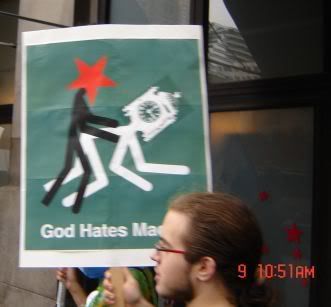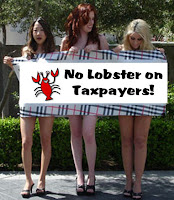How Wall Street Continues To Doom Itself
January 30, 2009 11:34 AM ET | Rick Newman | Permanent Link |
We’ve arrived at an ah-ha moment.
Virtually everybody who butters their own bread is outraged that Wall Street, which is becoming a de facto government agency thanks to billions in bailout money, found $18.4 billion in bonuses for bankers who nearly wrecked the world’s financial system in 2008. President Obama’s criticism – “shameful” – is mild compared to what many of us think.
The bankers are bellyaching about a 44 percent decline in bonuses from 2007 levels. That’s like complaining about being served a 40-ounce porterhouse instead of a 70-ounce one.
[See why "Wall Street talent" is an oxymoron.]
Here’s a bit more perspective: Charles Payne, CEO of the research firm Wall Street Strategies, points out that in 1985, Wall Street bonuses totaled $1.9 billion. The average recipient got $13,970. Since 1985, inflation has run 97 percent in total, according to the Bureau of Labor Statistics. That means that something worth $1 in 1985 would be worth $1.97 today. So follow the math:
Wall Street bonus pool in 1985: $1.9 billion
Value in 2008, if indexed for inflation: $3.75 billion
Actual 2008 bonus pool: $18.4 billion
Amount by which bonus pool exceeded inflation: 490 percent
Average Wall Street bonus, 1985: $13,970
Value in 2008, if indexed for inflation: $27,580
Actual average bonus, 2008: $112,000
Amount by which average bonus exceeded inflation: 406 percent
So pay for top Wall Streeters has risen 4 to 5 times as much as the rate of inflation since 1985. Of course those bankers are worth it, because of all the great things they’ve done for America during that time, like engineer the Long-Term Capital Management meltdown in 1998, the tech bubble that burst in 2001, the housing bubble that’s still bursting, a credit freeze that’s producing hypothermia at hundreds of real companies that actually make stuff, and the near collapse of the financial markets.
[See why it was a good move to let Lehman Brothers fail.]
If there’s a crowning absurdity, it’s that Wall Street mustered any bonuses at all in a year when the industry lost $34 billion. Does anybody else in America get a bonus when their company tanks? “Rewarding cataclysmic failure like this has to be what led to the fall of the Roman Empire,” Payne wrote in a recent note to clients.
It’s worth pointing out that not all Wall Street firms are as wayward as big offenders like Citigroup, Merrill Lynch, AIG, and Bank of America. Many made money in 2008, and any firm that isn’t asking for taxpayer handouts should be allowed to pay its people whatever it wants.
[See five pieces missing from Obama's stimulus plan.]
But the bonus brouhaha reveals so many disconnects in the financial industry that it could end up being a pivotal moment in the dismantling of the old Wall Street. Derivatives and “funding facilities” are hard for most people to understand. But gimme gimme gimme is a corruption we all understand. If the politicians didn’t have a clear rallying cry for going after Wall Street before, they sure do now.
10 February 2009
04 February 2009
Another reason to boycott Macys

As if their flagrant disrespect for Chicago history wasn't enough...
C'mon, I know this is actually 2004 bonus money, but getting all this cash ONE DAY after laying off 7,000 paycheck-to-paycheck employees... If this is your bonus, something tells me your annual salary is more than enough to pay the bills after giving back this money to save jobs of those who will be homeless without.
Seriously- I'm sleeping on my mother's couch in her living room for 3+ months because the state of California is too bankrupt to give me the unemployment funds it owes me. I'm a lucky one-- I know others who are sleeping in stairwells thanks, again, to CA bankruptcy. If WallStreet used that bonus money to pay their bills vs. incompetent staff wallets, perhaps there would be funds avail for state governments to pay their massive unemployment benefits- Jesus.
Macy’s execs get performance bonuses
By John Eckberg
jeckberg@enquirer.com
A day after Macy’s executives announced lay-offs of 7,000 workers and cut a dividend in half, top company officials received a final installment on $1.39 million in performance bonuses from 2004.
The stock credit plan created in March 2004 brought five top executives “phantom stock units” or stock credits after a three-year holding period ended on Saturday, according to a Securities and Exchange Commission filing on Tuesday.
Half of the incentive was paid in February 2008 with the remaining amount paid Monday.
Payments for stock credits and accrued dividends were as follows: Chief executive Terry J. Lundgren, $613,281; Karen Hoguet, chief financial officer, $192,742; Thomas Cole, chief adminstrative officer, $227,794; Janet Grove, vice chair, $227,794; Susan Kronick, vice chair, $227,794.
On Monday the company announced that swooning sales and poor earnings would bring thousands of pink slips to associates and reconfigure management of the company.
Labels:
bonuses,
ceo,
greed,
incompetence,
lay-offs,
selfishness
Finally SOMEone with a conscience

Good news today from our beloved real superhero, President Obama--
Obama caps executive pay tied to bailout money
By JIM KUHNHENN, Associated Press Writer
44 mins ago
WASHINGTON – President Barack Obama on Wednesday imposed $500,000 caps on senior executive pay for the most distressed financial institutions receiving federal bailout money, saying Americans are upset with "executives being rewarded for failure."
Obama announced the dramatic new government intervention into corporate America at the White House, with Treasury Secretary Timothy Geithner at his side. The president said the executive-pay limits are a first step, to be followed by the unveiling next week of a sweeping new framework for spending what remains of the $700 billion financial industry bailout that Congress created last year.
The executive-pay move comes amid a national outcry over huge bonuses to executives heading companies seeking taxpayer dollars to remain afloat. The demand for limits was reinforced by revelations that Wall Street firms paid more than $18 billion in bonuses in 2008 even amid the economic downturn and the massive infusion of taxpayer dollars.
"This is America. We don't disparage wealth. We don't begrudge anybody for achieving success," Obama said. "But what gets people upset — and rightfully so — are executives being rewarded for failure. Especially when those rewards are subsidized by U.S. taxpayers."
The pay cap would apply to institutions that negotiate agreements with the Treasury Department for "exceptional assistance" in the future. The restriction would not apply to such firms as American International Group Inc., Bank of America Corp., and Citigroup Inc., that already have received such help.
"There is a deep sense across the country that those who were not ... responsible for this crisis are bearing a greater burden than those who were," Geithner said.
Firms that want to pay executives above the $500,000 threshold would have to use stock that could not be sold or liquidated until they pay back the government funds.
Generally healthy institutions would have more leeway. They also face the $500,000 limit if they're getting government help, but the cap can be waived with full public disclosure and a nonbinding shareholder vote.
Obama said that massive severance packages for executives who leave failing firms are also going to be eliminated. "We're taking the air out of golden parachutes," he said.
Other new requirements on "exceptional assistance" will include:
_The expansion to 20, from five, the number of executives who would face reduced bonuses and incentives if they are found to have knowingly provided inaccurate information related to company financial statements or performance measurements.
_An increase in the ban on golden parachutes from a firm's top five senior executives to its top 10. The next 25 would be prohibited from golden parachutes that exceed one year's compensation.
_A requirement that boards of directors adopt policies on spending such as corporate jets, renovations and entertainment.
The administration also will propose long-term compensation restrictions even for companies that don't receive government assistance, Obama said.
Those proposals include:
• Requiring top executives at financial institutions to hold stock for several years before they can cash out.
• Requiring nonbinding "say on pay" resolutions — that is, giving shareholders more say on executive compensation.
• A Treasury-sponsored conference on a long-term overhaul of executive compensation.
Top officials at companies that have received money from the government's Troubled Asset Relief Program already face some compensation limits.
And compensation experts in the private sector have warned that such an intrusion into the internal decisions of financial institutions could discourage participation in the rescue program and slow down the financial sector's recovery. They also argue that it could set a precedent for government regulation that undermines performance-based pay.
"It's not a government takeover," Obama stressed in an interview Tuesday with CNN. "Private enterprise will still be taking place. But people will be accountable and responsible."
Still, some elected officials were pushing for the stricter caps.
Sen. Claire McCaskill, D-Mo., has proposed that no employee of an institution that receives money under the $700 billion federal bailout can receive more than $400,000 in total compensation until it pays the money back. Her figure is equivalent to the salary of the president of the United States.
Even some Republicans, angered by company decisions to pay bonuses and buy airplanes while receiving government help, have few qualms about restrictions.
"In ordinary situations where the taxpayers' money is not involved, we shouldn't set executive pay," said Sen. Richard Shelby of Alabama, the top Republican on the Senate Banking Committee.
"But where you've got federal money involved, taxpayers' money involved, TARP money involved, and the way they have spent it, with no accountability, is getting close to being criminal."
Subscribe to:
Posts (Atom)



